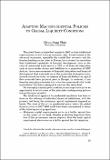Artículo
Adapting macroprudential policies to global liquidity conditions
Date
2014Abstract
The global financial crisis that erupted in 2007 has had intellectual repercussions as well as large economic costs. Recent events in the advanced economies especially the capital flow reversals and the looming banking sector crises in Europe have shaken the conviction that traditional yardsticks of financial development such as the ratio of commercial bank assets to GDP or of financial integration such as cross-border claims and liabilities as a proportion of GDP. And yet those same measures of financial integration and financial development that were held up as the yardsticks of progress have instead turned out to be the engines of financial distress as capital flow reversals have gathered pace in Europe. In contrast it has been the emerging economies with what were presumed to be 'weak institutions' that have managed to weather the storm best.
Collections
View/


